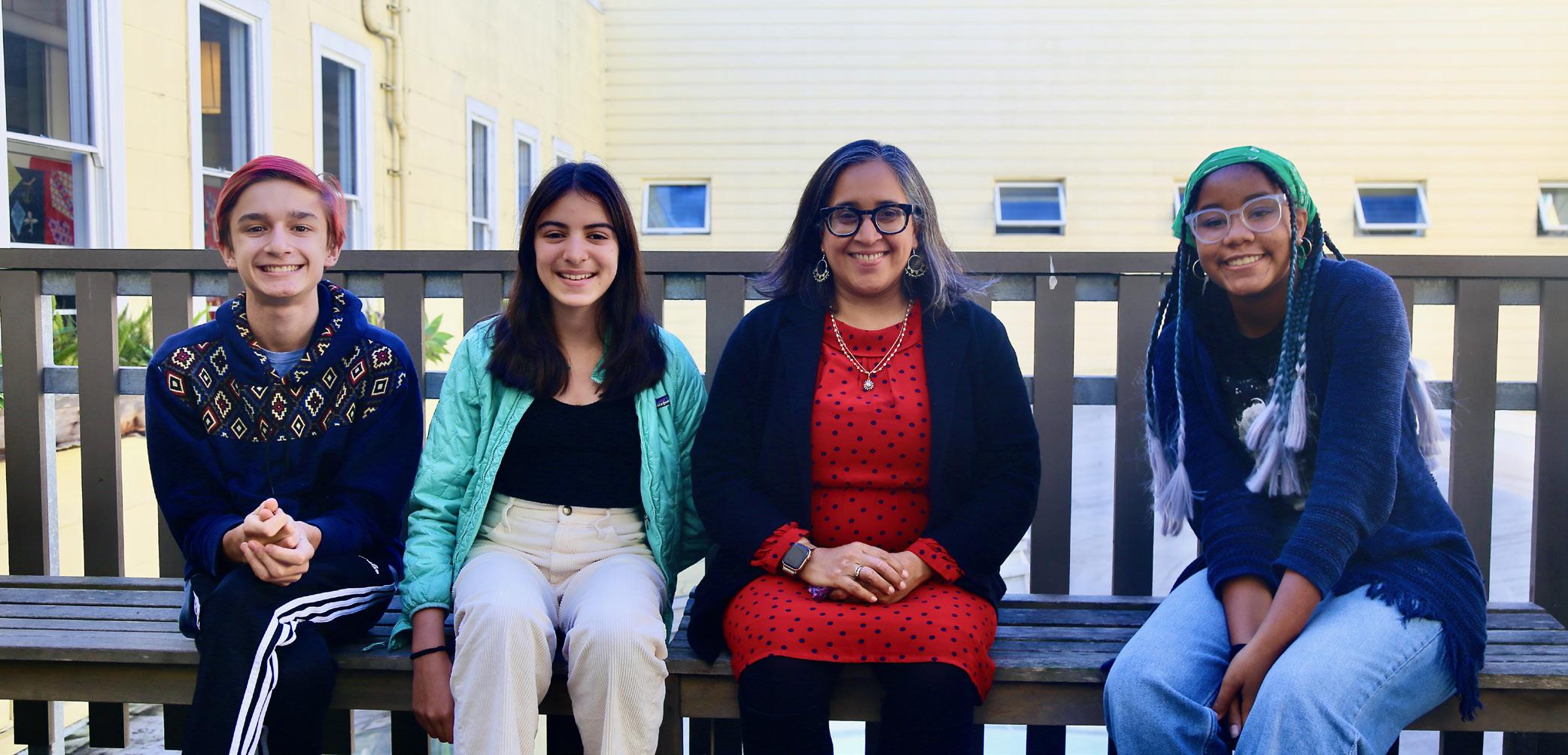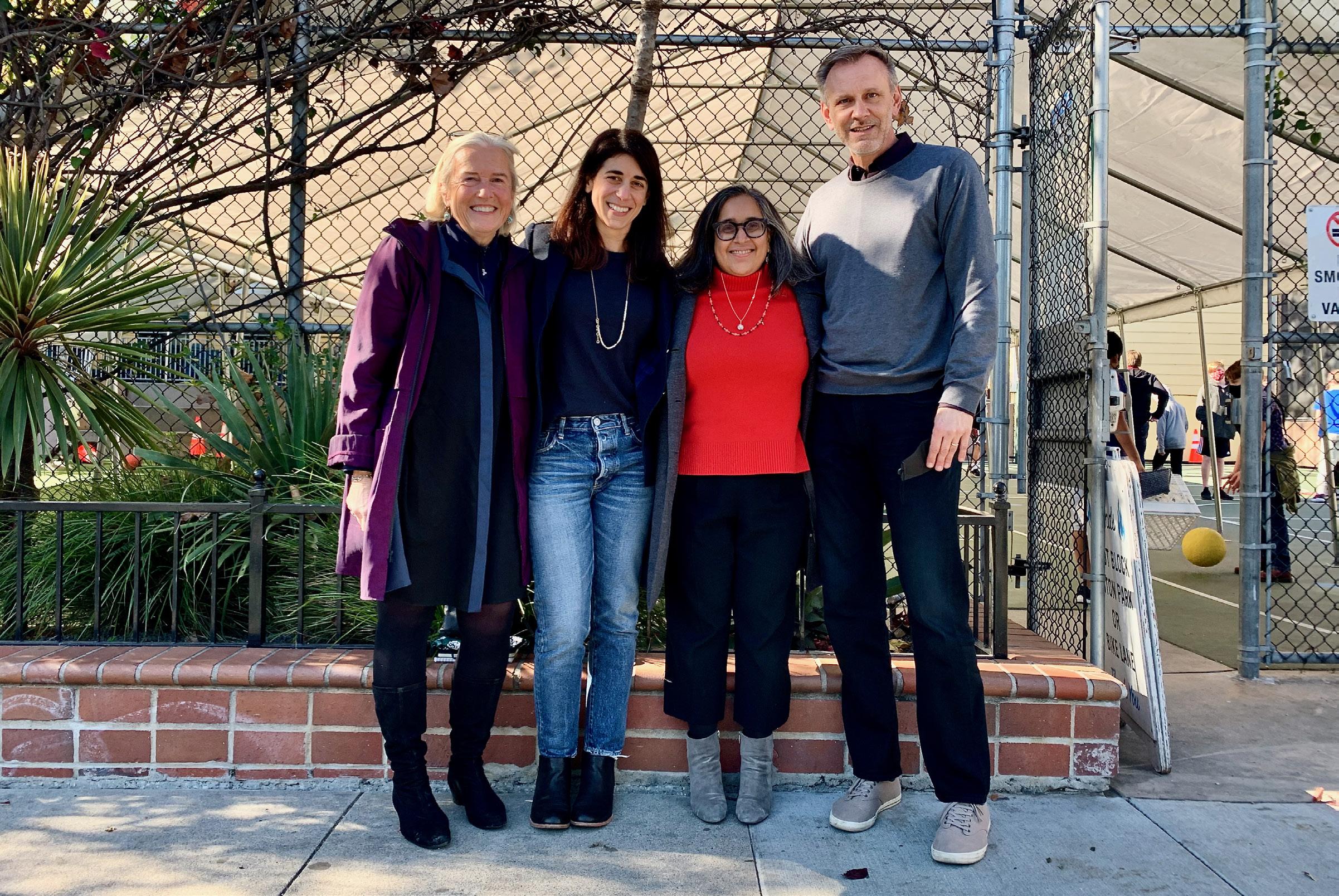
6 minute read
our 8th-graders take on an important interview
getting to know pankti
Three of our 8th-Graders—Ella Beckstead, Julian Coleman, and Sona Kempner—sat down with Incoming Head of School Pankti Sevak during her December visit to 250 Valencia to talk San Francisco, Quaker values, and everyone’s favorite topic: food.
Sona: I’m Indian, too, and I was wondering how your Indian heritage has influenced your view of the world?
Pankti: That’s a great question. You know, my parents really had so much pride in being Indian... So from a very young age, I was taught a lot of different traditions and I was raised speaking Gujarati—that’s my first language, not English. And so it’s always been a strong part of my identity and I was lucky as a child to get to spend a lot of time in India. I feel fortunate that a big part of my identity is being raised Hindu and listening to and reading stories about Indian mythology and understanding those stories as parables; they’ve been guideposts for me. I love the way that those stories helped me to think about what it meant to be a good person from the time I was very little.
Ella: How would you like to see the Friends community grow from where it is right now?
Pankti: One thing I’ve heard a lot about on my last visit is how the
school tackles diversity, equity, and inclusion. And I think there’s an opportunity for the community to dig deeper into those issues. From what I’ve seen, the Friends School is already an inclusive, amazing place that has a lot of open dialogue, but there’s an opportunity to move further along in that, in talking about what it means to belong or... who we represent, who’s not here and why, and what we can do about it. I also feel that one of the most special things about a Quaker education is the value of stewardship and thinking about how your education is in service to the world and that what you learn has meaning that each person has the responsibility to
apply somewhere. That’s a value that I was raised with and something I think makes SFFS and any Quaker school really unique. So I’d like to see more ways to amplify that, to really look at ways in which students are impacting the world while they’re at Friends and even after they leave Friends.
Julian: What was your favorite part of New York and how does it compare to San Francisco?
Pankti: I live in Brooklyn, and I think of Brooklyn and San Francisco in a very similar way—a lot of coffee, a lot of books, unique hair, and people who take their food very seriously. I think of Brooklyn as a very interesting place because it has its own history, it’s changed a lot, and it’s a community unto itself. And that’s how I think of San Francisco—it’s this very unique place, a very interesting intersection of people, most or many of them maybe not from here. I feel like anytime I meet someone here they say, “I’m a transplant, but now I’m here and I don’t ever want to leave.” I feel that sense of community in both places.
Sona: I remember you talking about celebrating cultures and holidays at Friends Seminary in New York. Will we add a similar pro-
gram here, and why do you think these celebrations are important to a Quaker education?
Pankti: I do think it’s important and something that is very special. When I started at Friends Seminary, it wasn’t something that we did. But when students share different cultural holidays and experiences, it’s a way for them to [show how they’re unique]. It’s a very organic way to share parts of your background, who you are, and the traditions you enjoy with others, in community. So I think it’s a very natural way for people to learn about one another. For example, we always have this big Diwali celebration and Diwali is about light. And then Hanukkah comes along and we talk about light again—and there’s [that connection, and it is so amazing] to watch students understand that even though their backgrounds are different, there are actually so many similarities. I love the way that understanding can form. And I think that especially for people who are not represented in the majority of a population, that holidays are a way for them to be seen and for their voices to be amplified—and that’s a real opportunity.
Sona: What’s a way we could celebrate a holiday like Diwali at Friends?
Pankti: I think one of the things that is fun with these traditions [at Friends Seminary] is that they were student-derived. For example, about five or six years ago there was a group of South Asian girls who were all in the same grade who wanted to do something to celebrate Diwali. And I worked with them on what they wanted to do, so they wanted to make a presentation and share some of the foods of Diwali and their parents came in and lined the Meeting House with tea lights so they really took the time to decorate and talk about the ways in which people celebrate. I think some of those kinds of

On Page 11: Incoming Head Pankti met with 8th-Graders Julian, Sona, and Ella on a sunny December day. Above: Later that afternoon, she joined founding Head of School Cathy Hunter, Academic Dean Tracie Mastronicola, and current Head of School Mike Hanas for lunch.
things happen very organically in Lower School classrooms, but this is something we did division-wide, and everybody had the opportunity to participate in. And it also then became a place where the parents could come in and support and be with their kids on a particular day, so now people dress up on Diwali and a lot Friends bring in bindis and people put bindis on, and it’s very fun. So how would we do it? I would want it to be generated via student interest, guided by students and what feels meaningful to them. Because you don’t want to put people on the spot to do it either.
Ella: What’s something you’re excited about that you’ve seen that SFFS already has and that you’d like to build on? Pankti: One of the things that I really liked when I was walking around was the quotations on the glass windows that each 8th Grade class picks when they graduate. I love that; I would love to see that story told more widely. What are those quotations? How do they come to be? I’d love to [know what the process is]. And I bet that demonstrates in many ways a lot of the things you’ve learned about what it means living in community and also about making decisions together. I think that would be a wonderful story to tell.
Julian: What are your hobbies?
Pankti: My hobbies include cooking, yoga, and running. I don’t do yoga and running the way I would like to right now, I have to be very honest [laughing]. But I love being outside and one of my favorite places to be is the ocean. So anytime I have the chance, even though I live in the Northeast and even in the wintertime, I’m happy to go to the ocean and go for a walk. I’m really excited to live near the Pacific Ocean.
Ella: We should tell you, though, that much of the time here, it is COLD.
Pankti: Well, I’ll let you in on a secret, then: I do a polar plunge every year.
And there you have it: Pankti Sevak will be adjusting to life in San Francisco—and swimming at Ocean Beach—just fine. •








